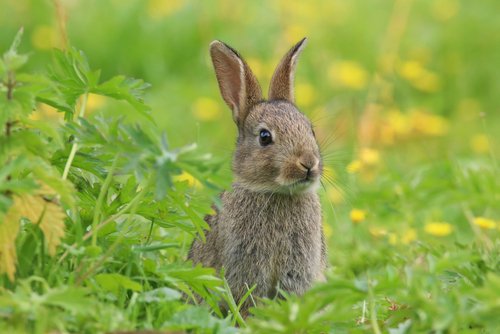Keeping Your Rabbit Healthy and Happy: A Complete Guide
Rabbits are delightful creatures that bring joy and companionship to our lives. As responsible caretakers, we must prioritize their well-being by ensuring they enjoy good rabbit health.
By diligently attending to their physical, mental, and emotional needs, we can significantly enhance their quality of life and longevity. Caring for rabbits involves proactive measures such as providing a balanced diet, adequate shelter, regular exercise, and prompt veterinary care when necessary.
An Overview of Common Health Issues in Rabbits
While many rabbits live long and healthy lives under proper care, it is important to be aware of potential health concerns that may arise. Understanding common health issues enables us to identify symptoms early on and seek appropriate medical attention promptly.
Some of the most prevalent health conditions in rabbits include dental problems such as overgrown or misaligned teeth; gastrointestinal issues like stasis and diarrhea; respiratory diseases such as snuffles (Pasteurellosis) or pneumonia; as well as urinary tract disorders like bladder sludge or infections. Through proactive education and diligent practices, we can provide our beloved rabbits with the best chance at a vibrant life free from avoidable ailments.
Let us delve deeper into each aspect so that we may become well-equipped to care for these endearing creatures effectively. [Word count: 242]
General Rabbit Care for Optimal Health
Proper Diet and Nutrition
Caring for rabbits includes providing them with a balanced diet to ensure their optimal health. The foundation of a rabbit’s diet should consist of high-quality hay, such as timothy or orchard grass, which is essential for proper digestion and helps maintain dental health. Hay provides the necessary fiber that keeps the gastrointestinal tract moving smoothly, preventing issues like gastrointestinal stasis.
Along with hay, fresh vegetables should be incorporated into their diet. Leafy greens like kale, romaine lettuce, and cilantro are rich in nutrients and provide variety in taste.
However, it’s important to introduce new vegetables gradually to avoid digestive upset. While pellets are a part of a rabbit’s diet, they should be limited as they can lead to obesity and dental problems if overconsumed.
Water Requirements and the Use of Water Bottles versus Bowls
Adequate hydration is crucial for rabbit health as it supports various bodily functions and prevents urinary tract disorders. Providing fresh water at all times is essential. Many rabbit owners opt for water bottles rather than bowls due to several advantages.
Water bottles help keep the water clean by preventing contamination from bedding or droppings that may occur with open bowls. They also reduce the chances of accidental spills that can make the rabbit’s living environment damp and uncomfortable.
Appropriate Housing and Environment
Creating a suitable housing environment is vital in promoting rabbit health and well-being. A spacious cage is necessary to allow rabbits enough room for movement and exercise – an active lifestyle contributes significantly to their overall fitness levels.
The ideal cage size depends on the breed but should have ample space for stretching out fully as well as separate areas for sleeping or hiding if desired by your furry friend. Bedding materials such as paper-based products or straws should provide comfort and absorb moisture.
Rabbit habitat should also include temperature control and ventilation considerations. Rabbits are sensitive to extreme temperatures; therefore, it is essential to keep their living area between 60-70°F (15-21°C).
Adequate ventilation helps maintain air quality, reducing the risk of respiratory issues that can arise in poorly ventilated spaces. This section covers the foundational aspects of general rabbit care for optimal health, including diet and nutrition, water requirements, housing, and environmental considerations.
By providing rabbits with a balanced diet consisting of hay and fresh vegetables while limiting pellets, owners can ensure proper nutrition for their furry companions. They are choosing the right water dispensing method – whether bottles or bowls – allows for easy access to clean drinking water.
Additionally, providing appropriate housing with enough space , suitable bedding materials, and a comfortable temperature range ensures rabbits have a safe and conducive living environment. Following these guidelines promotes overall well-being and maximizes the rabbit’s life expectancy within its habitat.

Preventive Measures for Rabbit Health
Vaccinations and regular veterinary check-ups
Regular vaccinations and veterinary check-ups are crucial for maintaining optimal health in rabbits. One significant vaccine to ensure their well-being is the inoculation against rabbit hemorrhagic disease (RHD). This highly contagious and potentially fatal virus affects the liver and other organs, causing internal bleeding.
Vaccination significantly reduces the risk of infection and should be administered by a qualified veterinarian. Alongside vaccinations, routine vet visits are essential for early detection of any potential health issues, allowing prompt treatment and prevention of complications.
Parasite Prevention
Parasites can pose a serious threat to rabbits’ health if not properly addressed. External parasites such as fleas and mites can cause severe itching, discomfort, skin irritation, and even transmit diseases. Regular grooming sessions with a flea comb can help detect any signs of infestation early on.
Additionally, veterinarian-approved topical treatments or insecticidal shampoos specifically formulated for rabbits can effectively prevent external parasites. Furthermore, internal parasites like worms can compromise a rabbit’s well-being if left untreated.
Proper hygiene practices play a vital role in preventing worm infestations. Cleaning the rabbit’s living area regularly, including removing soiled bedding promptly, helps minimize the risk of exposure to contaminated feces containing parasite eggs or larvae.
Common Health Issues in Rabbits
Dental health problems
Rabbits have constantly growing teeth that need proper maintenance to avoid dental issues. Overgrown teeth can occur due to malocclusion or inappropriate wear from natural chewing behavior. Signs of overgrown teeth include drooling, loss of appetite, weight loss, facial swelling, and reluctance to eat hard food items.
Treatment options may include filing or trimming the teeth under anesthesia by an experienced veterinarian. However, in severe cases, extraction may be necessary.
Malocclusion, a misalignment of the teeth, can lead to painful ulcers and abscesses if not managed promptly. Diagnosis is made through a thorough oral examination by a veterinarian, and treatment typically involves regular filling or extraction.
Gastrointestinal issues
Gastrointestinal stasis is a common problem in rabbits characterized by the slowing or cessation of normal gut movement. It can result from insufficient fiber intake, stress, dental problems, or pain.
Symptoms include reduced appetite, small or no fecal pellets, bloating, and lethargy. Prompt veterinary attention is crucial to prevent severe complications like gut obstruction or bacterial overgrowth.
Treatment approaches may include fluid therapy, medications to stimulate gut motility, and pain management, along with dietary adjustments. Various factors, such as dietary changes or infections like bacterial enteritis can cause diarrhea in rabbits.
Diagnostic procedures may involve fecal sample analysis to identify the underlying cause for appropriate treatment selection. Depending on the diagnosis findings, treatments may include fluid therapy to prevent dehydration and address any underlying infection or imbalances through antibiotics or probiotics.
Respiratory diseases
One respiratory condition that affects rabbits is snuffles (Pasteurellosis), which is caused by the bacteria Pasteurella multocida. The signs include sneezing, nasal discharge (often thick and pus-like), difficulty breathing due to nasal blockages, and eye inflammation. This condition can spread easily among rabbits housed together and requires immediate veterinary intervention for diagnosis through culture testing followed by appropriate antibiotic treatment.
Pneumonia is another respiratory disease that rabbits can develop due to various factors such as viral infections (e.g., rabbit coronavirus), bacteria (e.g., Bordetella), or inadequate environmental conditions leading to temperature extremes or poor ventilation. Risk factors for pneumonia include stressors like overcrowding and poor sanitation.
Clinical signs may include difficulty breathing, coughing, lethargy, reduced appetite, and nasal discharge. Treatment involves addressing the underlying cause and providing supportive care such as antibiotics, anti-inflammatory medications, and respiratory support.
Urinary tract disorders
Bladder sludge or stones can occur in rabbits due to various factors, including diet composition, genetic predisposition, or insufficient hydration. These can cause discomfort, pain during urination (straining), blood in the urine (hematuria), or even urinary tract obstruction.
A veterinarian can diagnose these conditions through physical examination, urinalysis, and imaging techniques like X-rays or ultrasounds. Treatment options may include dietary adjustments to promote proper mineral balance and hydration, along with possible surgical intervention if necessary.
Conclusion
Caring for rabbits is a multi-faceted task that requires attention to their overall health and well-being. Preventive measures such as vaccinations against rabbit hemorrhagic disease (RHD) and regular veterinary check-ups are crucial in maintaining optimal health. Additionally, diligent parasite prevention through external parasite control methods like grooming and internal parasite prevention through proper hygiene practices helps minimize the risk of infestations.
Recognizing common health issues like dental problems, gastrointestinal issues like stasis or diarrhea, respiratory diseases like snuffles or pneumonia, and urinary tract disorders allows prompt treatment to ensure a longer lifespan for our beloved furry companions. By staying vigilant with preventive care measures while promptly addressing any potential health concerns, we can provide rabbits with the quality of life they deserve – healthy days filled with joyous hopping in their carefully designed habitats.





